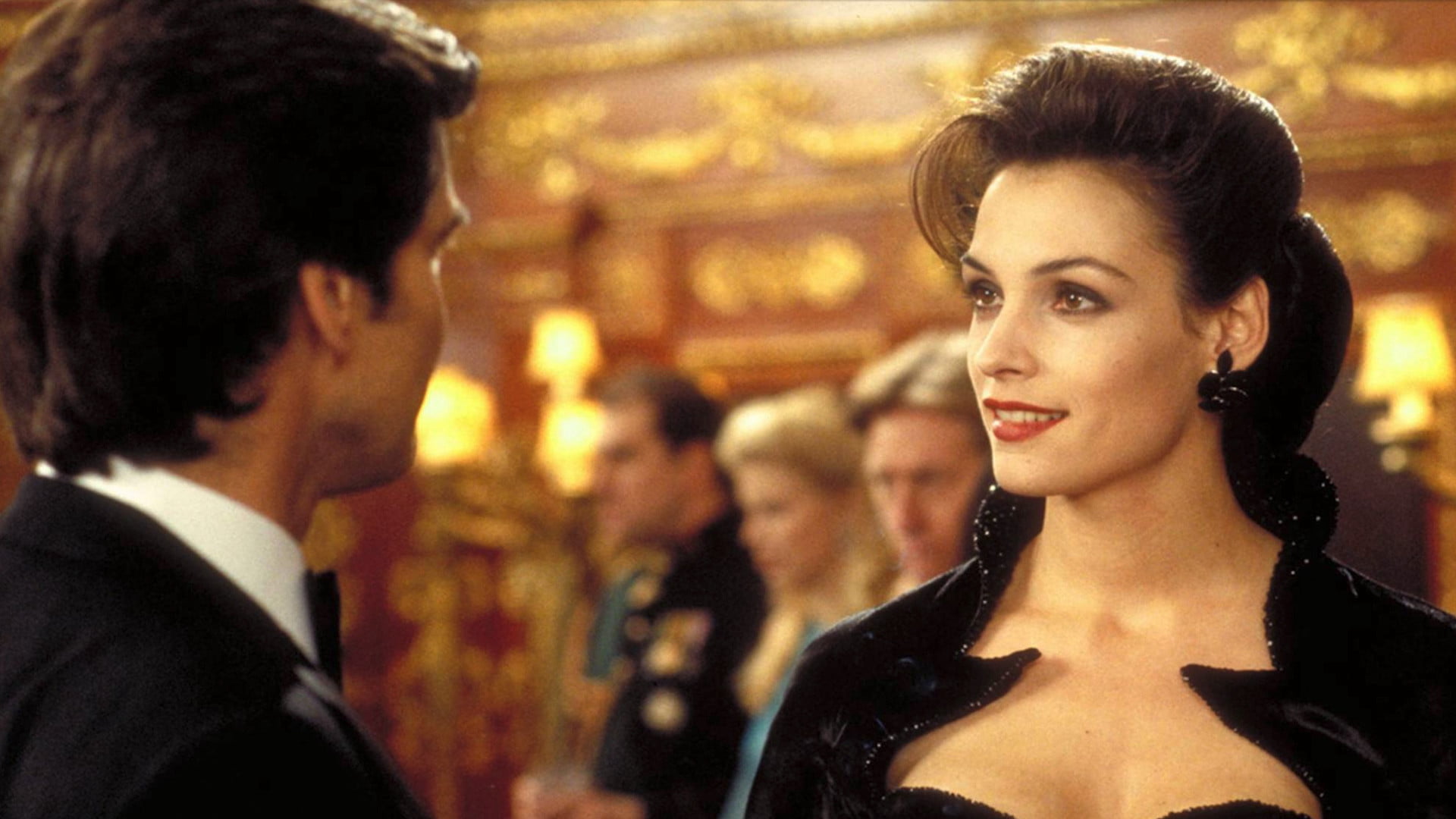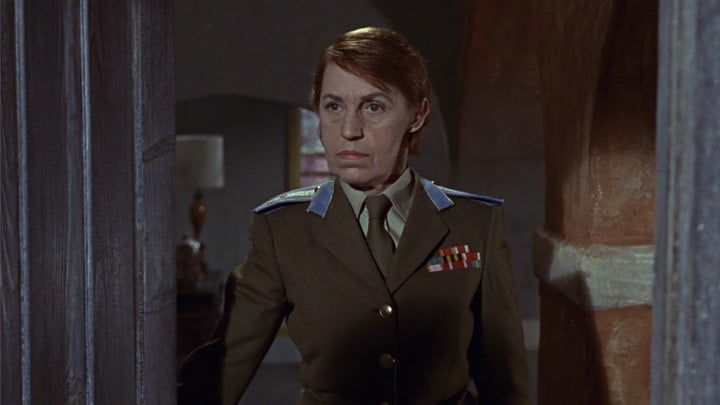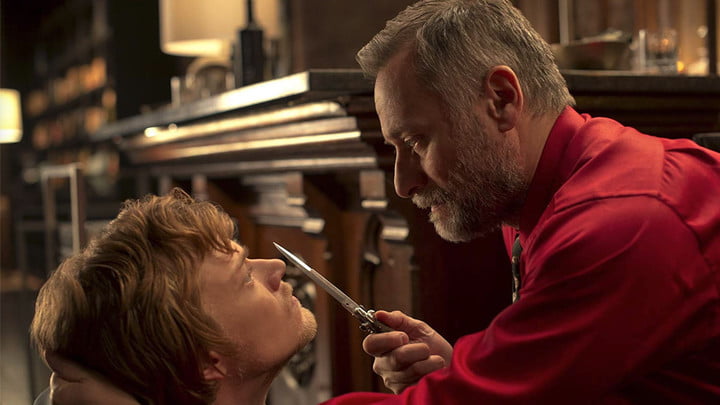Hollywood has always looked to America’s perceived and real enemies to populate the ranks of movie bad guys, and no enemy has been with us longer than Russia. Sure, the Nazis were arguably worse, but we took them out relatively quickly. The Russians have been pointing missiles at us since the 1950s! And even after the collapse of the Soviet Union in the 1990s, well, those missiles were still pointed at us — we just didn’t hear about it as much.
Once Vladimir Putin snuffed out Russia’s nascent democratic impulses at the turn of the century, moviemakers felt justified in continuing to demonize Russians both here (the Russian mob have been the bad guys in countless movies and TV shows) and abroad. With the Western world once again aligned against Moscow in the wake of its invasion of Ukraine, Hollywood will no doubt usher in a new era of Russian rogues and reprobates. In the meantime, we remember 10 famous Russian villains from the movies.
Rosa Klebb, From Russia with Love (1963)
It’s not enough that Rosa Klebb (Lotte Lenya) is a high-ranking former Soviet intelligence officer. She also defects to the Bond world’s enemy organization, SPECTRE, as if the movie is saying that you can’t trust those double-dealing Russkies for nothing! SPECTRE’s plan is to play the Soviets and the British off each other while luring Bond into a trap. Klebb’s job is to execute the details, including recruiting the assassin — a strikingly blonde and tall Robert Shaw — who tails Bond into Turkey (immortalized in glorious Technicolor).
Even by early Bond standards, From Russia with Love, featuring a brawl between two half-naked Gypsy women, is profoundly … unevolved. The movie represents Klebb as the antithesis of everything Bond values in women. She’s older, conventionally unattractive, brusque, and coded as being a lesbian. Not surprisingly, the beautiful young blonde (Daniela Bianchi) vanquishes her in the end.
The Soviet Union, Dr. Strangelove or: How I Learned to Stop Worrying and Love the Bomb (1964)
One of director Stanley Kubrick’s early career masterpieces, Dr. Strangelove became cultural shorthand for the insanity of nuclear war and of a species that would create the instrument of its own extinction. Kubrick knows that only savage black comedy could do the material justice and so he lampoons the entire global military-industrial complex.
The Soviet Union is nominally the enemy here, having created a “dead hand” doomsday device that will launch an ICBM strike against the United States even if Soviet command and control is taken out, effectively destroying the entire world. But Kubrick focuses his most savage critique on the Americans, particularly the war-crazed Air Force general Jack D. Ripper (Sterling Hayden), who tries to start WWIII without Pentagon authorization. Given the information that has emerged in recent years about how close we actually came to nuclear war with the Soviets, the film now plays almost more terrifying than funny.
Russian soldiers, Red Dawn (1984)
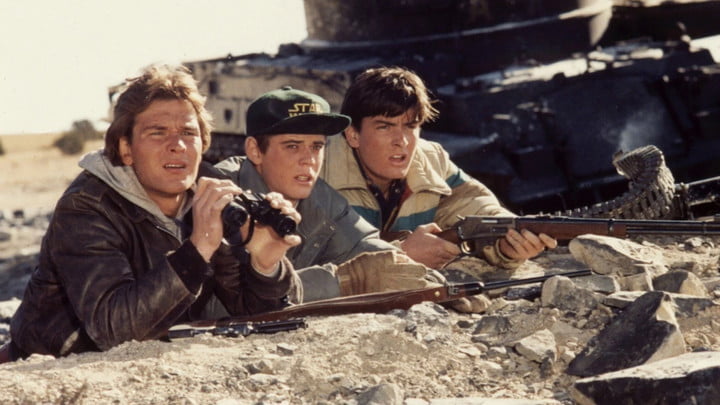
Ah, the early 1980s. Silly movie plots and nuclear tensions between the superpowers were at an all-time high. President Ronald Reagan wasn’t exactly trying to deescalate the rhetoric by calling the USSR an “evil empire,” and the U.S. “a shining city on a hill.” And, well, you heard the President, boys. Gotta protect that shining city! At least this is the sentiment of John Milius’ militant movie, featuring one of the most preposterous premises any film ever took seriously. Soviets and their allies invade the continental United States (with their conventional army, no less, somehow slipping by both U.S. defenses and radar), and its left to some Colorado teenagers (including Patrick Swayze and Charlie Sheen) hiding out in the countryside to take it all back.
In fairness, it’s meant to take place in an alternate reality, but still. Given that Hollywood was churning out lots of content both for and about teenagers by this time, the existence of Red Dawn makes a certain amount of sense. But much better movies were made about teenagers saving civilization from the threat of WWIII. Check out Wargames (1983), Real Genius (1985), and The Manhattan Project (1986) instead.
Ivan Drago, Rocky IV (1985)
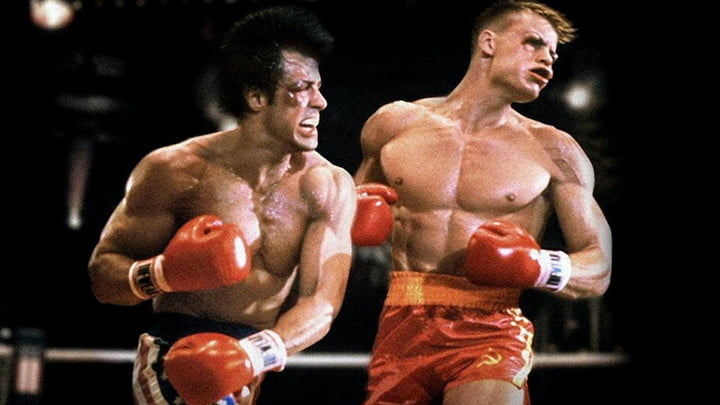
Few movie stars embody the rah-rah decade of punching and patriotism more than Sylvester Stallone. His slick, rippling pecs were on prime display throughout the 1980s in both the Rocky and the Rambo movies. Critics have argued that the muscle-bound meatheads of ’80s action cinema were a direct response to the demasculinization felt by many people due to the United States’ loss in Vietnam. Movies like Rambo: First Blood Part II (also released in 1985), in which the invincible hero returns to the battlefield to rescue American MIAs, provided an opportunity to rewage the war onscreen.
Rocky IV, in which the champ unretires to take on the steroid-engineered Soviet super-boxer Ivan Drago (Dolph Lundgren), likewise gave viewers a visceral outlet. Americans couldn’t do much about the threat of nuclear annihilation hanging over their heads, but they could surely cheer when the Russian hulk hit the canvas. Little more than a 90-minute montage, the movie has come to personify the slick, flashy, and earnest Hollywood cinema of the 1980s that was indelibly influenced by MTV, then in the first flush of its global popularity.
Loginov, The Hunt for Red October (1990)
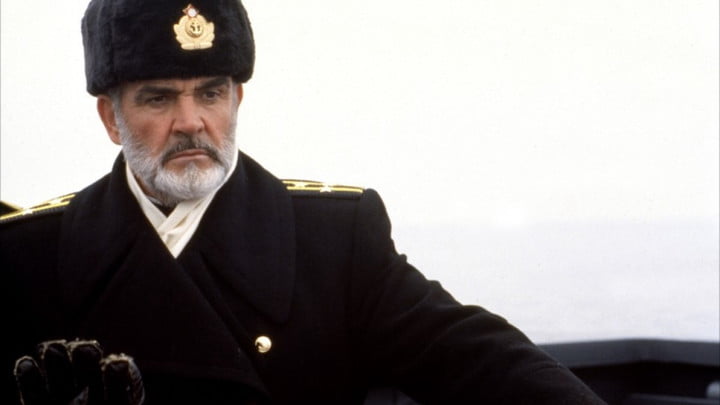
Otherwise known as the movie in which every actor playing a Russian speaks in whatever accent he prefers. Seriously, where was the dialect coach on this one? Based on Tom Clancy’s mega-bestseller from 1984, the Cold War was all but over by the time John McTiernan’s movie version made it to the screen six years later, but it was a hit nonetheless.
Perhaps with then-Soviet Premier Mikhail Gorbachev ushering in glasnost (meaning “openness”) and perestroika (“reconstruction”), and with the Berlin Wall in pieces, the tale of Russian sub commander Ramius (Sean Connery) defecting to the West rang even more true. Or perhaps it was just a chance to see Connery at the final peak of his stardom. The chief bad guy in this one is the Soviet spy on the sub, Loginov (Tomas Arana), who … ah, who cares. The film features Connery in peak form and a young Alec Baldwin as the first of many Jack Ryans.
Xenia Onatopp, Goldeneye (1995)
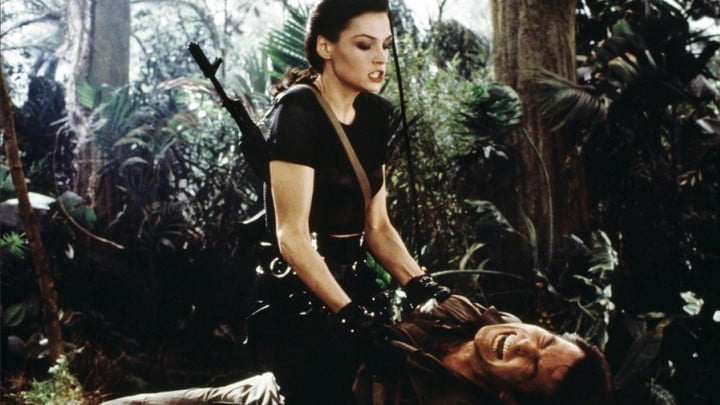
The James Bond franchise had started planning for the end of the Soviet Union six years earlier when Bond (Timothy Dalton) pivoted to another standard ‘80s villain, the Latin drug lord, in Licence to Kill (1989). But after decades of being locked out of filming in the USSR, there was no way the franchise was going to miss its opportunity to have the new Bond (Pierce Brosnan) careen a tank through St. Petersburg, even if the Cold War was over.
The main villain in Goldeneye is Bond’s erstwhile service-mate 006 (Sean Bean), but a secondary villain is the infamous Russian agent Xenia Onatopp (Famke Janssen), whose most memorable talent is the ability to squeeze a man to death between her thighs. The 1990s may have seen Bond wrestling with more progressive gender impulses — casting Judi Dench as M, for example — but Onatopp proved it had a ways to go.
Egor Korshunov, Air Force One (1997)
Harrison Ford’s last big hit made from original material (i.e., not Star Wars or Indiana Jones), Air Force One has him playing U.S. President James Marshall, a former Vietnam combat veteran and Medal of Honor recipient who proves he can still pack a punch despite all that boring stuff they make him do in the Oval Office. Ford had not yet entered the phase of his career where viewers noticed he never smiles, and what would eventually be seen as stodgy and humorless was still appreciated here as committed and serious-minded.
Of course, every action hero needs a good adversary, and Gary Oldman had built up serious villain cred playing unhinged characters like Sid Vicious, Lee Harvey Oswald, Dracula, Beethoven, and that psycho who screams “Evvverrrrryyyyone!” in The Professional (1994). Here he plays a Russian terrorist, Egor Korshunov, who hijacks Air Force One in a bid too restore the good old days of totalitarianism. And his plan might have worked, too, except, you know, HARRISON FORD IS THE PRESIDENT.
Viggo Tarasov, John Wick (2014)
The movie that introduced the legend has the titular character (Keanu Reeves) go all-in against the Russian mob after the son of a crime boss (Alfie Allen, channeling his Theon Greyjoy from Game of Thrones into an even slimier coward here) famously steals his car and kills his dog. The dog is the final gift from his beloved, recently deceased wife (Bridget Moynahan), and its vicious killing untethers Wick from all that he has left in the world, freeing him to go on an epic revenge spree the likes of which wouldn’t be seen again until, well, the sequels. The son — vacuous and ignorant — knows not of the Baba Yaga (Wick’s nickname, loosely translated from the Slavic to mean Boogeyman) he has unleashed. But his father, Viggo (Michael Nyqvist), does, propelling him to send out legions of minions, along with New York City’s underground assassin network, to put down Wick for good. Not that it helps. Everybody knows you can’t kill the Boogeyman.
Aleksander Bremovych, Atomic Blonde (2017)
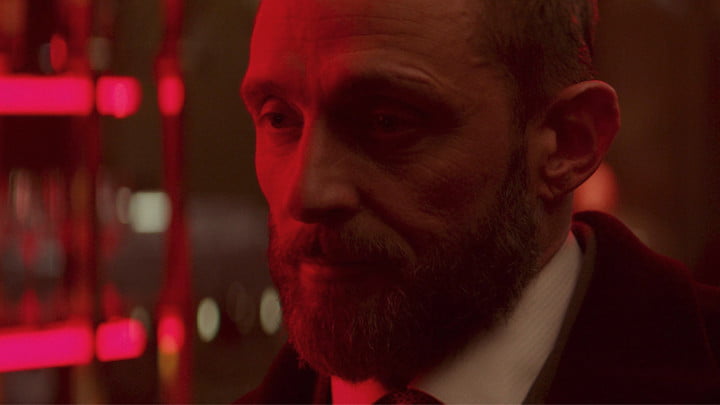
Atomic Blonde, starring Charlize Theron as a superspy embroiled in late ’80s Cold War intrigue, takes place in Berlin not Russia, but rest assured, Commie bad guys threaten our hero throughout! Among them is the Soviet agent Aleksander Bremovych (Roland Møller), who does really mean Russian villain things like beat a guy to death with a skateboard. More central to the proceedings is David Percival (James McAvoy, radiating charisma), who may or may not be part of the Russian outfit. It’s all sort of hard to figure out, not that it matters given the style on display. The movie is like a 1980s fever dream, pulsing with neon and a pitch-perfect soundtrack of synth classics. Director David Leitch worked as an uncredited director on John Wick and it shows. The extended long take sequence in which Theron battles Stasi thugs in a stairwell is one of the most impressively staged fights ever.
General Dreykov, Black Widow (2021)
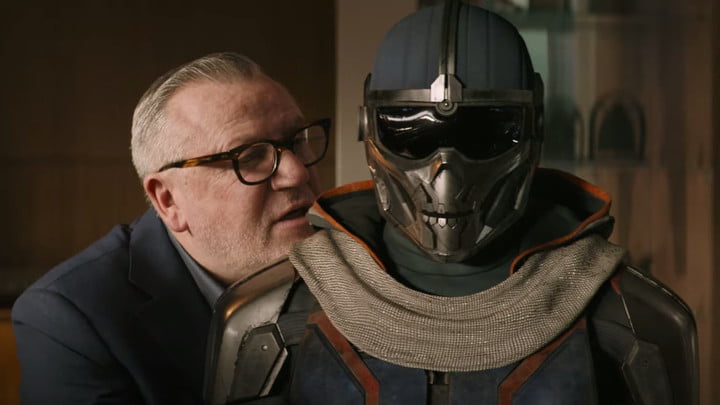
Early on, Natasha Romanoff, aka Black Widow (Scarlett Johansson), watches Moonraker (1979) – not one of James Bond’s more acclaimed outings – almost as if to signal to viewers to not expect anything great this time out. Sure enough, featuring a Moonraker-esque climax during which our heroes infiltrate a fortress above the clouds, Black Widow is one of Marvel Studio’s less heralded entries. Not that the movie doesn’t have its pleasures, chief among them the cast, which features many Americans and Brits competently doing Russian accents (the dialect coach on this one was clearly on point).
Since even our heroes are morally compromised from their espionage exploits over the years, the film is technically full of Russian villains, including Natasha herself, who is responsible for a heinous act that leaves her guilt-ridden. But the worst of the lot is General Dreykov (Ray Winstone) who runs the Black Widow program that enslaves young Russian girls and transforms them into assassins. Although Dreykov’s real crime seems to be that – unlike the Red Guardian, Natasha’s loveable screw-up of a super-soldier stepdad (David Harbour) – he’s beyond redemption as a father.
